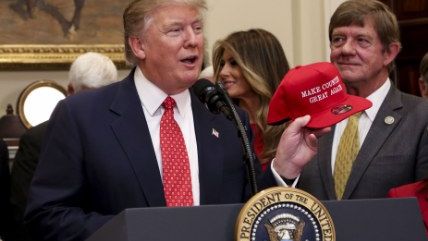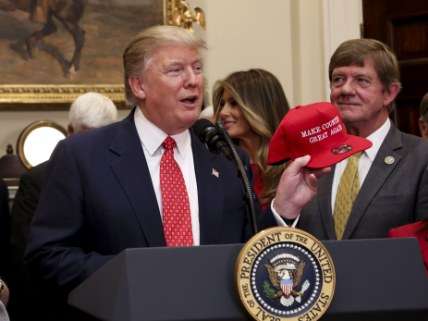Trump the Weakling
Our president has already backed down quite a bit.


When rocker Tom Petty found out Republican George W. Bush was blaring his song "I Won't Back Down" at campaign rallies in 2000, he sent a cease-and-desist letter. Maybe the reason Donald Trump avoided the song in his campaign is that he didn't want similar trouble. Or maybe it's because he will, in fact, back down.
After a federal court blocked his February travel ban, Trump tweeted, "See you in court, the security of our nation is at stake!" From that bold declaration, you would expect him to fight all the way to the Supreme Court. But he didn't. On Monday, he caved in and issued a new travel ban designed to appease the judiciary.
Backing down is not a departure from his usual style. It is his usual style. Trump is not a guy who can be counted on to stand his ground. Often, he crumbles under the slightest pressure.
Ask the Chinese. Shortly after he was elected, he took a call from the president of Taiwan, in defiance of the long-standing U.S. policy of recognizing only one China. Then, when the Beijing government took offense, he snapped back on Twitter, asking, "Did China ask us if it was OK to devalue their currency?"
Conservatives applauded his manly bravado. Former U.N. Ambassador John Bolton said Trump was alerting the Chinese that "nobody in Beijing gets to dictate who we talk to."
Actually, somebody in Beijing does. His name is Xi Jinping. He's the president of China, and he refused to speak with Trump on the phone until he agreed to eat his words. As China's government media reported, Trump tamely assured Xi that "the U.S. government adheres to the One China policy."
Sean Spicer did his best to mask the humiliating retreat. Asked whether the president had gotten anything in return, the press secretary insisted, "The president always gets something." Of course he does. In this instance, he got a lesson in the ancient Chinese art of kowtowing.
The surrender came as no surprise to anyone who watched him during the campaign, or after. After months of promising his supporters that he would build a border wall at Mexico's expense, he paid a visit to President Enrique Pena Nieto in Mexico City and, at a news conference afterward, admitted he didn't even raise the topic: "We didn't discuss payment of the wall."
In fact, Pena Nieto said later that during their session, he informed his guest that Mexico would not pay for it. Only when he was safely back across the Rio Grande did Trump dare to repeat that our neighbor will foot the bill.
During his second debate with Hillary Clinton, Trump informed her, "If I win, I am going to instruct my attorney general to get a special prosecutor to look into your situation, because there has never been so many lies, so much deception." He hasn't.
After his boast about grabbing women by the genitals came out on video, several women came forward to accuse him of groping or kissing them without their consent. He denied it and announced, "All of these liars will be sued after the election is over." When is that lawsuit going to be filed?
Probably right after he finishes fighting the lawsuit against Trump University. Oh, wait—he has already finished that fight, by capitulating.
"I don't settle cases," he said last year about the dispute. "Watch how we win it." But in the end, Trump agreed to pay $25 million to the people accusing him of fraud.
Idle threats are his specialty. Last year, he pledged to "immediately terminate President Obama's two illegal executive amnesties," one of which allowed unauthorized immigrants brought here as children to stay and work. But that order is still in place, to the disgust of anti-immigration groups. "His thinking is: 'We don't have to deal with this right now,'" explained Spicer in February.
Oh, you thought "immediately" meant "right now"?
On torture, NATO, seizing Iraq's oil and the Iranian nuclear deal, Trump's Cabinet officers have contradicted him—and he has let them. When confronted by people with sturdy backbones, Trump has real trouble backing up his fierce words. And he is finding it harder to intimidate political opponents and foreign leaders than he expected.
We've all heard of the wolf in sheep's clothing. More often than not, Trump is a sheep in wolf's clothing.
© Copyright 2017 by Creators Syndicate Inc.
